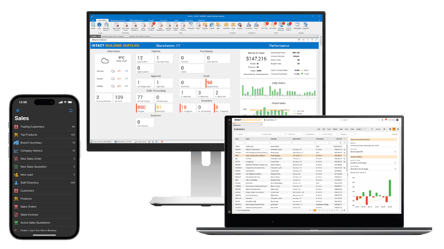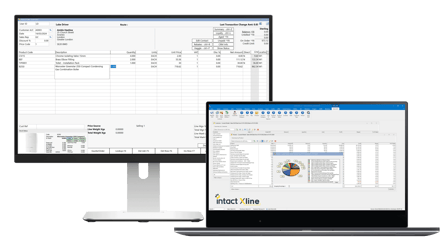Businesses which import and export goods between the UK and Europe face significant changes from 1 January 2021. Brexit means new rules and tariffs for the UK-EU supply chain, so companies must prepare ahead of the new year to ensure a smooth transition.
At Intact, we don’t claim to be Brexit experts but understand that many of our customers and partners will be affected by the new import/export changes. That’s why we’ve put together this guide covering the need-to-knows of the Brexit transition; a way of showing our support at this pivotal juncture.
Here, we’ll look at the import and export rules set to be introduced in January, and the ways you can prepare. For general advice on preparing for Brexit, read our recent post.
Key Changes to Importing and Exporting After Brexit
Brexit will affect businesses in different ways. Some may have little to do by way of preparation, and others lots. That’s why we’d urge all businesses to review the new rules with time to spare – in case they fall into the latter category.
Below, we list the key changes to importing and exporting rules from 1 January, which apply to businesses both in the UK and the EU. We’ll also look at things that might change, as well as points to be aware of.
EORI Number
If you don’t already have one, you’ll need to obtain an EORI number to continue trading with the EU; the same applies for EU companies trading with the UK. An EORI, or Economic Operator Registration and Identification, is a unique code used to track and record customs information.
From 1 January, businesses will need two EORI numbers: one for their country of origin and another for the country they’re trading with.
Businesses in the UK can apply for a country-of-origin EORI number from HMRC. To obtain a code for the country you’re trading with, head to the EU National Customs portal.
If you’re in Ireland, apply for an EORI on the Revenue portal.
In the UK and already have an EORI number? You’ll need a new one if it doesn’t start with ‘GB’.
It’s critical that UK businesses get a new EORI number before 1 January. That’s because, unlike the UK government, the EU Commission has provided no grace period, so you need the right codes to avoid delays and red tape.
Commodity Codes and Tariffs
Import and export tariffs are changing from 1 January. So, you need to double-check the commodity codes you use to classify goods on your customs declaration.
HMRC’s Trade Tariff tool makes it easy to find the code you need to classify your goods. If you’re in Ireland, you’ll need to use the EU’s TARIC classification tool; Revenue can provide more details on this.
Commodity codes are based on product type, material and production method, so be as accurate as you can to make sure you get the correct codes.
If you want to avoid the headache of getting the wrong commodity codes, it’s worth outsourcing these logistics to a customs agent or broker. Customs agents specialise in the legalese of import and export tariffs and processes, meaning they’re well placed to help businesses move forward and prepare for 1 January.
Lead Times
Less a change, more a consideration; lead times for the import and export of goods may be significantly longer following the Brexit transition, particularly in the first quarter of 2021. Businesses should, therefore, look to sure-up their supply chain and networks – ascertaining that partners and suppliers have taken action to smooth the transition.
Licensing Requirements
In the wake of Brexit, new licensing requirements may apply to some goods imported to the UK from the EU, or vice versa. A customs agent will be able to offer advice to businesses on any new or adjusted licensing regulations.
Incoterms
Another key area of consideration is incoterms – chiefly, who is responsible for them within your organisation. Make sure that your processes and workflows align with up-to-date trade laws and best practices; you may need to assign a senior-level manager to oversee the review.
Additional Costs
Consider how you will treat additional costs related to Brexit in your product file. With additional direct and indirect costs all-but-guaranteed to be a side-effect of the transition, make sure that these are accounted for within your supply chain.
Can your current systems and processes accommodate new transactions and expenses? And how might the new pricing impact on how you cost your goods and products moving forward?
VAT
It’s likely that the new post-Brexit trade arrangement could lead to changes to VAT costs on goods imported to the UK. Though not a given, it’s something to be mindful of as the realities of the new import/export landscape set in.
Import and Export Checklist for Businesses After Brexit
While there’s no one-size-fits-all solution for Brexit preparations, businesses reliant on importing and exporting goods between the UK and the EU would do well to take a checklist-approach to make sure nothing is missed.
As a minimum, here are the steps you’ll need to take to sure-up your business ahead of 1 January:
- Apply for EORI numbers – or check your current EORI is permissible.
- Check and classify goods with up-to-date commodity codes
- Enlist the expertise of a customs agent to smooth the logistics of the transition
- Review your supply chain, suppliers and processes to safeguard lead times
- Look into new or updated licensing regulations
- Review Incoterms and up-to-date legislation and best practices
- Prepare for the realities of additional costs
Remember, this is only a provisional checklist, and your Brexit preparations may look a lot different. That’s why seeking third-party expertise and support can be a helpful way to ensure your operations are watertight in time for the January transition.
Where to Find Help for Importing and Exporting Goods After Brexit
Help and support is available for all businesses preparing for Brexit, both in the UK and the EU. To point you in the right direction, here’s a list of guides, resources and helplines.
For Businesses on the UK Mainland
https://www.fsb.org.uk/campaign/uktransition.html
https://brexitfacts.blog.gov.uk/2019/09/27/government-help-for-businesses-preparing-for-brexit
For Businesses in Northern Ireland
https://www.investni.com/prepare-for-eu-exit
For Businesses in Ireland
https://www.dfa.ie/brexit/getting-ireland-brexit-ready/
General Help and Advice
https://iccwbo.org/resources-for-business/incoterms-rules/incoterms-2020/
https://www.bbc.com/news/uk-politics-50838994
https://www.cbi.org.uk/uk-transition-hub/exporting-goods-to-the-eu/
At Intact, we’re here to help our customers and partners get through the Brexit transition period. Offering support and advice, we can help you negotiate and overcome regulatory changes which could impact your software and operations – whether you’re in the UK, Northern Ireland, Ireland or elsewhere. To talk to a member of our team, visit the homepage.





